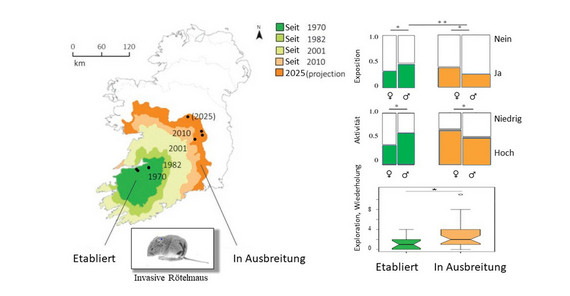“We were primarily interested in finding out how many risks the individual animals were willing to take while exploring their surroundings,” summarizes Prof. Dr. Jana Eccard from the University of Potsdam. “We had expected to find particularly brave pioneers in edge populations.” More than 300 bank voles in six different Irish wooded areas were studied by the researchers with the help of a risk test. “In edge populations along the current expansion zone, however, individuals were significantly more risk-averse and less active compared to animals from the core populations,” the scientist explains. “A test labyrinth we constructed in the woods, on the other hand, was explored more thoroughly by the edge population than by the core populations.” Expansion into an unfamiliar terrain with unfamiliar predators and unfamiliar hiding places is very dangerous for voles, so that only such individuals that are especially careful and explorative are able to successfully spread in expansion edge zones. A particularly careful edge population thus develops over many generations of expansion. Once a population is established, however, other traits like competitive ability lead to success, so that boldness and activity increase again after a few generations.
The spatial structure of expanding populations can be transferred to many different animal expansion processes. The researchers’ papers show that the study of individual differences within a population can contribute to our understanding of ecological processes like biological invasions.
Link to the publications (open access):
Eccard, JA, Mazza V, Holland, C, Stuart P 2023 The timid invasion: behavioural adjustments and range expansion in a non-native rodent. Proceedings of the Royal Society B, 290: 20230823. http://doi.org/10.1098/rspb.2023.0823
Mazza, V, Eccard, JA 2023 Expanding through the Emerald Isle: exploration and spatial orientation of non-native bank voles in Ireland. Current Zoology online: https://doi.org/10.1093/cz/zoad038
Image: Bank voles were introduced to Ireland from Central Europe in 1920 and have continued to spread across the island ever since. At several locations (black dots), the behavior of individual animals was studied. Individuals in the expansion zone (orange) are more careful and less active than animals in the established zones (green), but they also explore more extensively.
Contact:
Prof. Dr. Jana Anja Eccard, Department of Biology and Biochemistry (Animal Ecology)
Phone: 0331 977-1923
E-Mail: jana.eccarduuni-potsdampde
Media information: 26-09-2023 / No. 097

